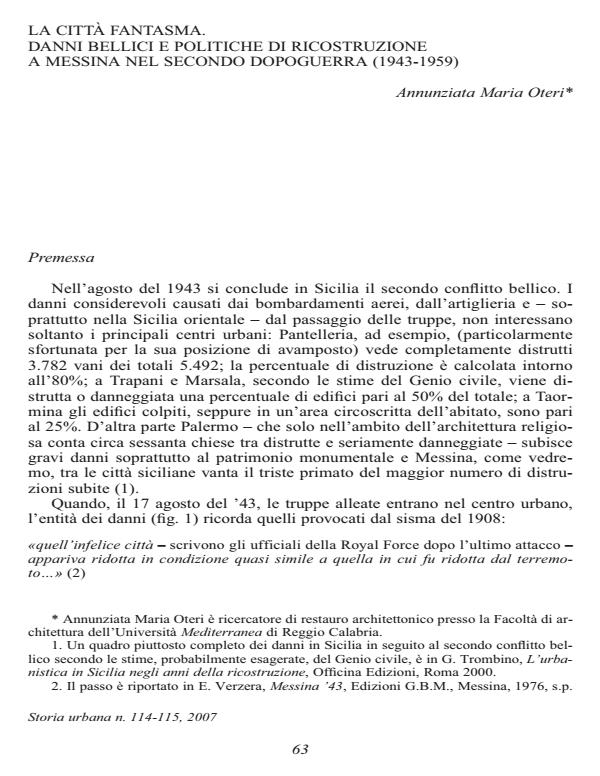La città fantasma. Danni bellici e politiche di ricostruzione a Messina nel secondo dopoguerra (1943-1959)
Titolo Rivista STORIA URBANA
Autori/Curatori Annunziata Maria Oteri
Anno di pubblicazione 2007 Fascicolo 2007/114-115
Lingua Italiano Numero pagine 50 P. 63-112 Dimensione file 1701 KB
DOI
Il DOI è il codice a barre della proprietà intellettuale: per saperne di più
clicca qui
Qui sotto puoi vedere in anteprima la prima pagina di questo articolo.
Se questo articolo ti interessa, lo puoi acquistare (e scaricare in formato pdf) seguendo le facili indicazioni per acquistare il download credit. Acquista Download Credits per scaricare questo Articolo in formato PDF

FrancoAngeli è membro della Publishers International Linking Association, Inc (PILA)associazione indipendente e non profit per facilitare (attraverso i servizi tecnologici implementati da CrossRef.org) l’accesso degli studiosi ai contenuti digitali nelle pubblicazioni professionali e scientifiche
The phantom city. War damage and the reconstruction policy for Messina after the Second World War, 1943-59 (by Annunziata Maria Oteri) - ABSTRACT: This essay retraces the vicissitudes connected to the reconstruction of Messina after the Second World War highlighting, in particular, the atypical feature of this reconstruction within the national context. Due to its geographical position, Messina was the most damaged Sicilian city during the bombing. At the onset of the war it had not yet finished the major reconstruction following the earthquake of 1908, and the new strategies for the rebirth of the city in some cases bore the consequences of previous errors and shortcomings. In fact, although Messina was not involved in the debate at national level on demolition work, layout of thoroughfares and more generally the modernization of the historic center (because as a rebuilt city it already incorporated modern criteria), none the less it is a fact that initially war destruction though not imposing significant changes to the urban structure offered an opportunity to reflect on the post-earthquake condition of the city, on the lack of identity of its inner city center, on the relationship with the architectural aspects of monuments already rebuilt and again destroyed by bombing. However, in spite of nominal attempts and considerable aid secured from Allied Command, the debate on reconstruction did not result in far-sighted urban planning, as shown by the failure to produce, the extent of damage notwithstanding, a reconstruction plan which would at least eliminate the errors of the old plan of 1911.
Annunziata Maria Oteri, La città fantasma. Danni bellici e politiche di ricostruzione a Messina nel secondo dopoguerra (1943-1959) in "STORIA URBANA " 114-115/2007, pp 63-112, DOI: